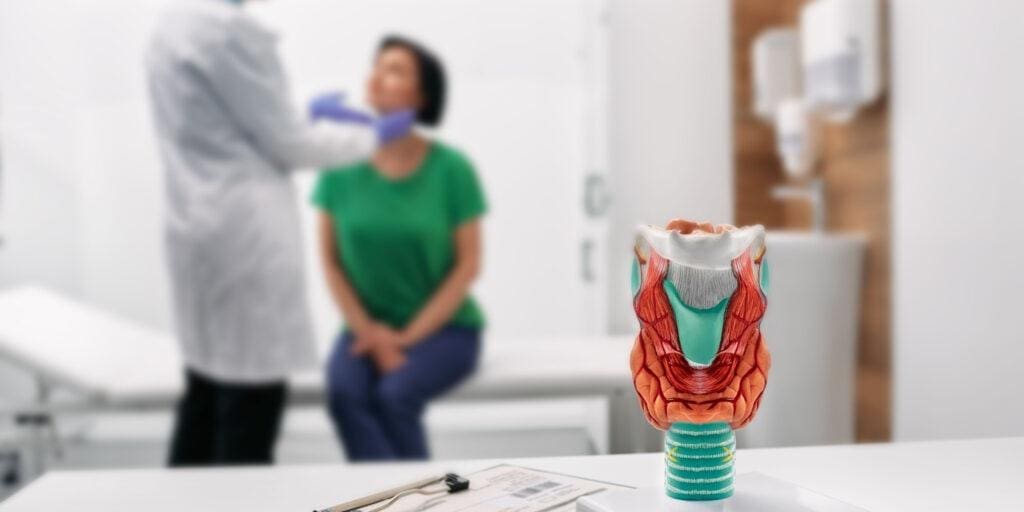Every January brings us the opportunity to raise awareness for thyroid diseases. Even though thyroid conditions are incredibly common throughout the country and the world, many people still aren’t sure how the thyroid works, what symptoms to look out for, or how to get checked for potential concerns.
It’s important to use thyroid awareness month as an opportunity to educate and learn, speak with others, and take the time to assess ourselves for any signs of thyroid disease. With that, here are five things you should know during thyroid awareness month to ensure you are doing everything you can for your health.
1. The thyroid is a butterfly-shaped gland

Did you know that the thyroid is a butterfly-shaped gland that is part of the endocrine system? Its shape is unique to its location in the body as it resides in the front of the lower area of the neck.
The thyroid’s main function is to regulate the hormones that it produces. These hormones are produced and then distributed throughout the body. They impact essential functions like heart rate, blood pressure, and metabolism.
The thyroid also controls the rate at which things are processed in the body. This means that when the thyroid isn’t functioning as it should, the symptoms can be quite noticeable.
2. Thyroid diseases can cause many different symptoms
The symptoms of thyroid disease vary depending on the condition as well as on the individual who is experiencing them. That said, some signs to keep an eye out for include:
- Unexplained weight loss or gain
- Unexplained fatigue
- Increase in mental health symptoms
- Hair loss
- Difficulty sleeping
- Rapid heartbeat
The thyroid is often either underactive, meaning it is not producing enough of the hormones to keep the body functioning, or it is overactive and releasing too much of the thyroid hormones. These imbalances then result in one or more of the symptoms shown above.
Thyroid cancer can also be a major concern. Having a lump or swelling in the neck near the thyroid is a red flag that you need to visit your doctor. The four types of thyroid cancer include:
- Papillary thyroid cancer
- Follicular thyroid cancer
- Medullary thyroid cancer
- Anaplastic thyroid cancer
These types of cancer range in their severity and symptoms. Luckily, many thyroid diseases, including cancer, can be detected through either blood work or imaging. And when they are caught early enough with these tests, treatment tends to be much more effective.
3. Some thyroid diseases can be detected through blood work
If you are experiencing any of the symptoms of a thyroid disease, your doctor might send you for blood work. Blood tests are one of the most effective ways to look for issues with the thyroid. These blood tests measure two different hormone levels, known as T3 and T4, that your thyroid produces.
If the test results come back abnormal, your doctor will talk to you about the next steps. For further information, specialized imaging might be necessary. Additionally, if you do have a thyroid nodule and abnormal blood test results, you may need a biopsy to check for anything malicious. Rest assured, though, that there are many different treatments for thyroid diseases that can help you to feel better and healthier once again.
4. Many thyroid conditions can be diagnosed and treated


Treatment for thyroid diseases will differ depending on the type of condition you have as well as the symptoms you are experiencing. For an underactive thyroid or hypothyroidism, for example, there are medications that are proven to be effective in getting the body to produce more of the hormone that it needs to control energy levels, appetite, sleep, and so on.
This is one example of thyroid hormone treatment, which can treat many different thyroid conditions. Other interventions for concerns with the thyroid include:
- Suppression therapy to stop the growth of thyroid tissue
- Eliminating gluten from your diet
- Thyroid surgery (i.e., to remove a nodule)
- Thyroidectomy to remove the entire thyroid
When you do need to take medication, change your lifestyle, or have surgery to control your thyroid disease, you might feel overwhelmed. Something to keep in mind during thyroid awareness month is that combining these interventions with mental health services can help you to feel happier overall. This is especially important when your thyroid concerns cause mental health distress, like depression and anxiety.
Having the right support system is also key during whatever treatment you are going through. That’s why thyroid awareness month can be extremely helpful—it’s a way for your friends, family members, and other people in your life to learn more about what you are going through.
5. If you have a thyroid condition, you are not alone
Perhaps the most important thing to know during thyroid awareness month is that you aren’t alone. Having a chronic condition can feel isolating. Many times, people feel as though they are dealing with their symptoms on their own. However, there is a whole community of people out there who understand what it’s like to live with a thyroid disease.
In fact, the American Thyroid Association states that approximately 20 million Americans have a thyroid disease. Interestingly, middle aged women are more likely to have a thyroid condition compared to men. But anybody can struggle with a thyroid condition regardless of gender or age.
If you do have a thyroid disease, take the opportunity this thyroid awareness month to connect with others who also must live with the symptoms and side effects of these conditions. The more you speak about your own experiences, the more others will be able to understand the significant impact that thyroid diseases can have on a person. From there, it will only get easier to find support, get effective treatment, and manage your thyroid condition one day at a time.
How Are You Recognizing Thyroid Awareness Month?
Let us know in the comments below!
What Topics Should We Cover Next?
Email us your ideas at info@painresource.com
Join the Pain Resource Community
Did you know Pain Resource has different groups for different conditions? Connect with others who share the same condition as you here.




